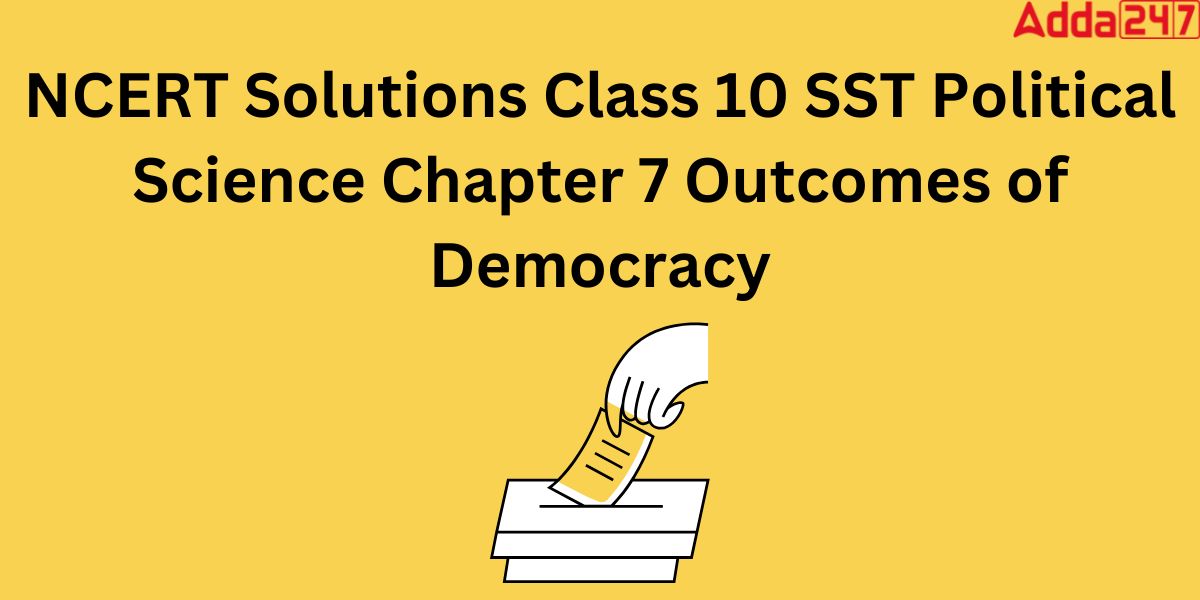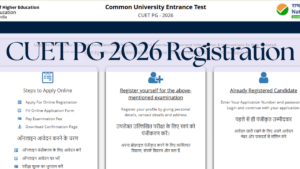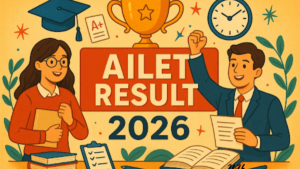NCERT Solutions Class 10 SST Political Science Chapter 7 Outcomes of Democracy Notes are given in this article.NCERT Solutions Class 10 is the best resource for obtaining a good score in the class 10 board Examination. Here are Adda247 Expert faculty team prepared NCERT Solutions Class 10 SST Political Science Chapter 7 Outcomes of Democracy exercises of that chapter for a better grasp of the topics. These NCERT Solutions answer all questions in an easy and simple manner. These solutions will help you understand the concepts covered in the chapter completely. By writing these answers in the exam students will undoubtedly be able to achieve high scores. Keep learning with Adda247.
NCERT Solutions Class 10 SST Political Science Chapter 7 Outcomes of Democracy Pdf
NCERT Solutions Class 10 SST Political Science Chapter 7 Outcomes of Democracy is given in pdf format so students can easily download it for future use. Click here to download NCERT Solutions Class 10 SST Political Science Chapter 7 Outcomes of Democracy
NCERT Solutions Class 10 SST Political Science Chapter 7 Outcomes of Democracy: Topics
Students will learn what a democratic nation is like and study about its characteristics in the class 10 SST Political science chapter 7 on the outcomes of democracy. Discussed in relation to democracy will be the effectiveness of the government, economic prosperity, inequality, social diversity, conflict, and lastly freedom and dignity. Let’s take a quick tour of the topics which are included in the class 10 SST Political science chapter 7 outcomes of democracy
- How do we assess democracy’s outcomes?
- Accountable, responsive, and legitimate government
- Economic growth and development
- Reduction of inequality and poverty
- Accommodation of social diversity
- Dignity and freedom of the citizens
NCERT Solutions Class 10 SST Political Science Chapter 7 Outcomes of Democracy Questions with Answer
Exercises Page No. 99
1. How does democracy produce an accountable, responsive and legitimate government?
Answer. Democracy provides a responsive government due to the fact that democratic governments are formed by the people’s elected representatives, These officials discuss social issues and develop programmes and policies as a result. Additionally, People may decide not to vote for these elected officials in the subsequent election if they do not perform their duties effectively.
• Governments created through democratic processes are responsive to the needs and expectations of the people. Elections are held on a regular basis and are free and fair. It ensures that the populace has the freedom to select their leaders and the power to oust them if they fail to serve their interests. Citizens have a right to information about their governments and how they operate in democracies.
•Democracies are legitimate because they follow a constitution. Even the members of the government must adhere to the laws of the nation. A democratic government is one that the people control. People want to be ruled by the leaders they chose through the public election. In the following election, voters will have the option to reject any parties, if they are inappropriate.
2. What are the conditions under which democracies accommodate social diversities?
Answer. By concentrating on all the social communities inside the society, social diversity can be accommodated. It is important to offer both the majority and minority communities fair consideration. when it is clear that democracy is more than just the majority’s rule and that the majority’s rule does not merely apply to one particular religion or social group. Understanding that the majority does not express itself through language or religion is equally vital. In a democracy, anyone or any organisation can gain the majority.
3. Give arguments to support or oppose the following assertions:
- Industrialized countries can afford democracy but the poor need dictatorship to become rich.
- Democracy can’t reduce the inequality of incomes between different citizens.
- The government in poor countries should spend less on poverty reduction, health, and education and spend more on industries and infrastructure.
- In a democracy, all citizens have one vote, which means that there is an absence of any domination and conflict.
Answer.
- This claim is untrue. The economic development of a country depends on the resources, the policies, and the openness of the government to draw in investment. Industrialized countries can afford democracy, but the impoverished need a dictatorship to get affluent. Economic growth and democracy are not causally related.
- Yes, democracy cannot reduce income inequality because there are segment groups with diverse occupations However, there may be a number of social and economic factors contributing to income inequality. Despite having the opportunity to vote and access fundamental rights, people must create their own income, which is dependent on their capacity to work.
- The government in poor countries should spend less on poverty reduction, health, and education a spend more on industries and infrastructure.The assertion is untrue. Any nation’s development must prioritize its human resources. The people of a nation make it up. The best resource for a country is “human resources,” hence poor countries actually need to spend more on these areas.
- It is true to say that in a democracy, each voter has one vote, which has equal weight. However, it is not a conflict-free system that is impenetrable. Certain groups do tend to dominate others in some democracies, and conflicts may occasionally occur. Democracies follow the constitution, which uses negotiation to address these problems.
4. Identify the challenges to democracy in the following descriptions. Also, suggest policy/institutional mechanisms to deepen democracy in the given situations:
a) Following a High Court directive, a temple in Orissa that had separate entry doors for Dalits and non-Dalits allowed entry for all from the same door.
Answer: The provision of equal status to all of its citizens in spite of their caste is cited as the first obstacle to democracy. People were treated unfairly in this situation based on their caste. In a democracy, every citizen is treated equally regardless of caste, creed, religion, or level of wealth.
b) A large number of farmers are committing suicide in different states of India.
Answer: A large number of farmers are committing suicide in different states of India because Because of the nation’s economic inequality. Farmers of Different States Has to experience significant loss because of unstable weather conditions and not getting proper price. In this case, the government overlooked the well-being of the oppressed and did not put any programmes in place to reduce poverty. The farmers’ desperate act of suicide was a result of their poverty and inability to pay back the loans they had taken out.
c) Following the allegation of killing of three civilians in Gandwara in a fake encounter by Jammu and Kashmir police, an enquiry has been ordered.
Answer: Allegations about the state’s police force are raised by claims that three civilians were killed in Gandwara by the Jammu and Kashmir police during a fake encounter. This circumstance demonstrates how the government has fallen short of ensuring the safety of all of its people. The difficulty in this situation is in managing the authority of the police and other powerful people. People should have their faith restored, and those who are guilty, even if they are in the government, should be punished.
5. In the context of democracies, which of the following ideas is correct – democracies have successfully eliminated?
- conflicts among people
- economic inequalities among people
- differences of opinion about how marginalised sections are to be treated
- the idea of political inequality
Answer. 4. the idea of political inequality
6. In the context of assessing democracy which among the following is odd one out? Democracies need to ensure:
- free and fair elections
- the dignity of the individual
- majority rule
- equal treatment before the law
Answer. 3. Majority rule
7. Studies on political and social inequalities in democracy show that
- democracy and development go together.
- inequalities exist in democracies.
- inequalities do not exist under a dictatorship.
- dictatorship is better than democracy.
Answer. 3. inequalities exist in democracies.
Read More:
NCERT Solutions Class 10 SST Political Science Chapter 7 Outcomes of Democracy-FAQs
Q.How do I acquire the NCERT Solutions for Class 10 SST Political Science Chapter 7 in an online PDF format?
Ans. you can download the NCERT Solutions for Class 10 SST Political Science Chapter 7 PDF from the link provided in the post.
Q.How can use NCERT Solutions for Adda247’s Political science Chapter 7 for Class 10 SST benefit you?
Ans. The following are some benefits of using Adda247’s NCERT Solutions for Class 10 SST Political Science:
- Students are given both the NCERT solution and a video explanation.
- A PDF is also provided, which can be downloaded and saved for future use.











 CUET PG Crash Course 2026: Subject-Wise ...
CUET PG Crash Course 2026: Subject-Wise ...
 CUET PG 2026 Registration Form OUT at ex...
CUET PG 2026 Registration Form OUT at ex...
 AILET Result 2026 Release Date, How to D...
AILET Result 2026 Release Date, How to D...














